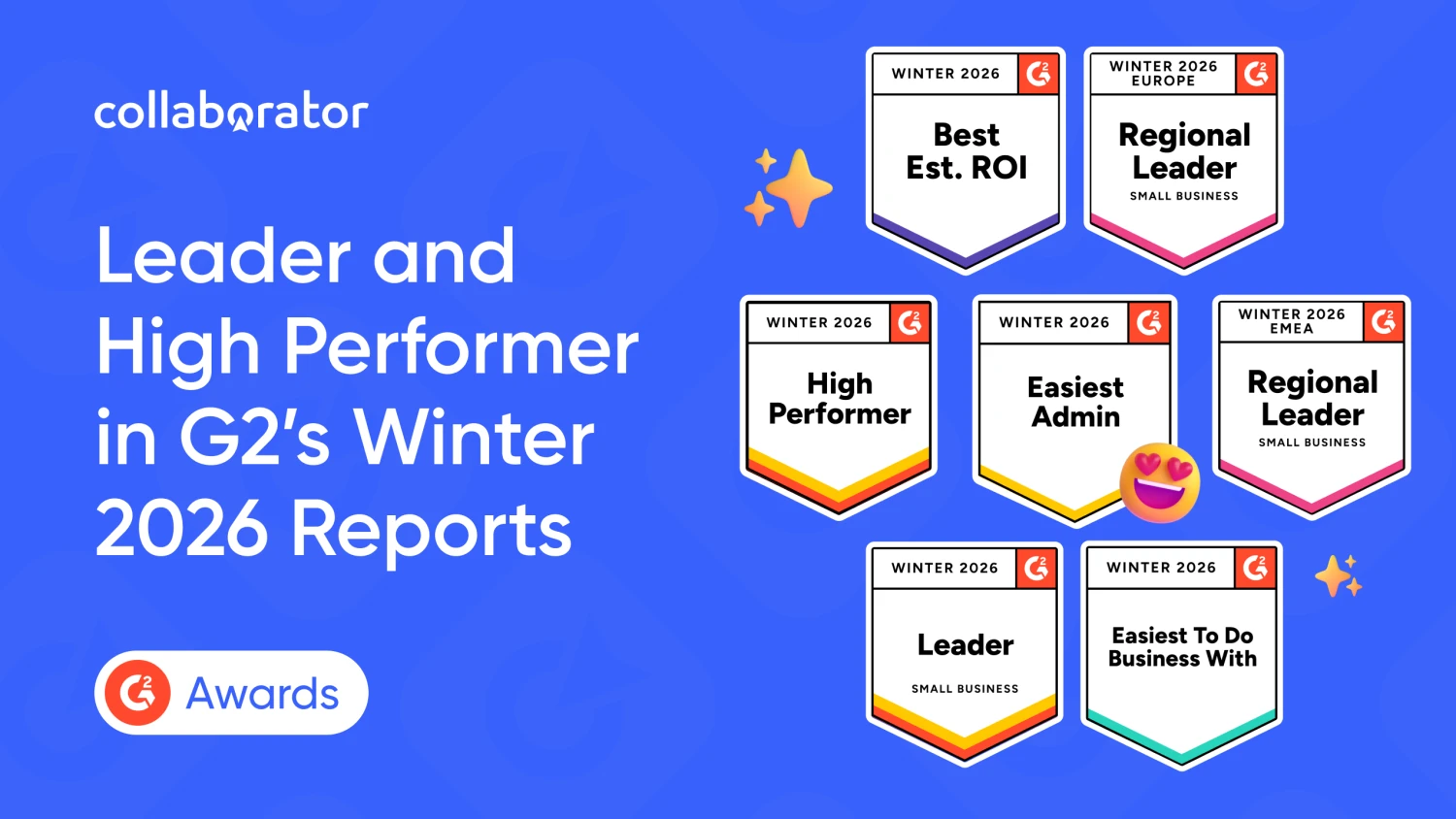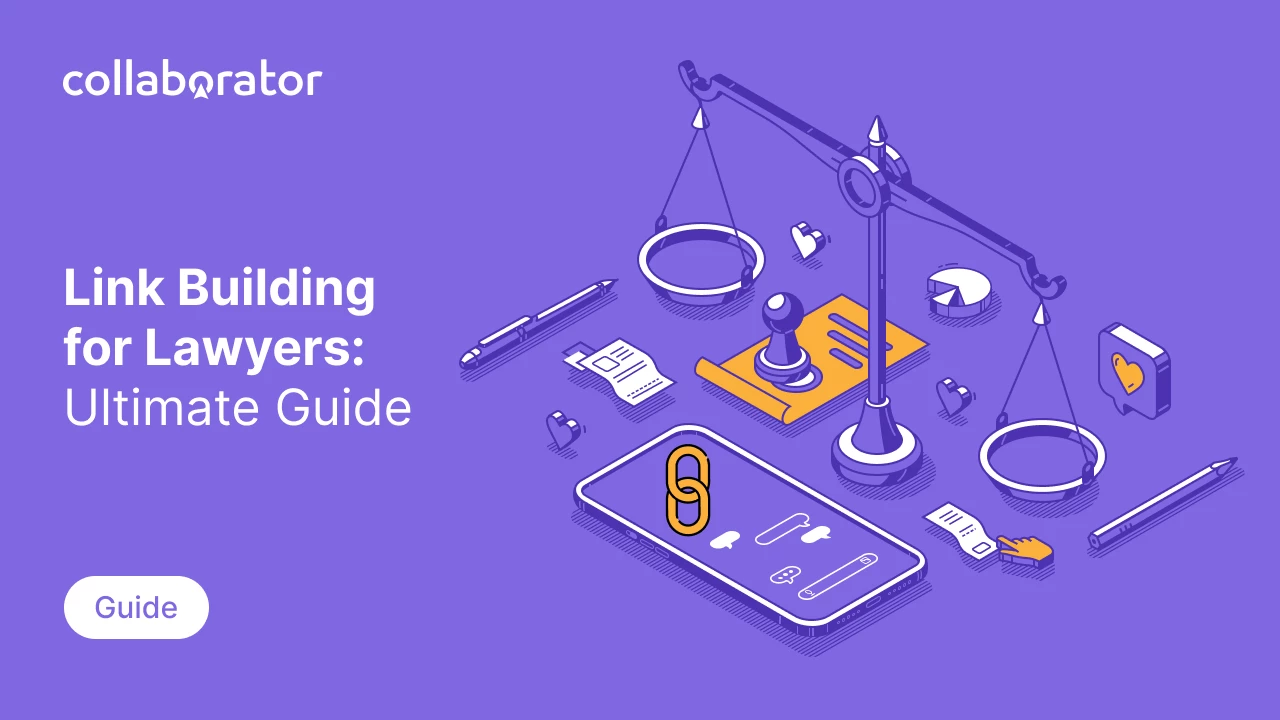
Law firm marketing has never been more challenging than it is now. In a world of fast-paced media, where you only have a fraction of a moment to catch the user's attention, you have to stand out to advertise your lawyer services successfully. Of course, paid advertising and marketing agencies can always help you out, but if you want to dive deeper and grow your law firm website organically, this article is for you.
In this article, we will discuss link building for law firms and attorneys, the best tactics and strategies, basics and principles of SEO for lawyers, and much more. So, let's dive in!
Why is Link Building Important for Lawyers?
As with any other business, law firms have to be promoted. Word of mouth and good reviews play a massive role, but you need to boost your online presence to stand out. And by that, we don't mean buying ads or being active on social media. We're talking about organic growth.
One of the best ways to organically grow your website is to build a strong backlink profile. According to BrightEdge, organic web listings get 73% of clicks — this also doubles by HubSpot's data on the top traffic source for all websites being organic search. Moreover, Backlinko states less than 1% of users click on the second page of search engine results, and pages with the highest number of backlinks rank best. So what does all this mean?
This means that a strong backlink profile is crucial to any law firm's promotion. Link building for lawyers is just as important as for any other business. The data suggests that the stronger the backlink profile, the higher your chances of ranking in top SERPs, resulting in higher traffic. Effective link building for law firms benefits both law firms and private attorneys, bringing in more potential clients.
In recent years, link building for lawyers has evolved. Backlinks are still an important ranking factor. However, the approach has shifted from simply gaining links to focusing on their quality and relevance. In 2025, it's no longer just about the number of links your website has (like in 2013). It’s about more strategic, reputation-based link building.
Keep in mind that lawyers should focus on ethical link-building practices to establish a trustworthy online presence. To make that happen, make sure your marketing efforts, including link building, reflect your commitment to professional standards. When in doubt, check with your bar association’s guidelines on legal advertising and online promotion to stay on the right track.
Top 10 Link Building Strategies for Lawyers
Let's dive into our ultimate guide on lawyer link building. The below-listed strategies will work well for both new and established law firms.
1. Use Legal Directories
One of the most popular, albeit helpful, SEO tactics for law firms is getting them out there in legal directories. These directories are one of the best link building sites for attorneys, but be aware: these links have the lowest value, as anyone can get them. To have a strong backlink profile, you must cover this base.
The good news is that those directories are relevant, and many have high authority. So, getting backlinks from high-authority legal websites isn’t as hard as it seems — it’s as simple as creating a profile on reputable legal directories, which is typically free. However, there are also some paid ones that deserve attention.
Before proceeding to build directory links, let’s discuss what actually makes a legal directory link valuable vs. not valuable.
|
|
Valuable Legal Directory Link |
Not Valuable/Harmful Link |
|
Domain Authority |
High — from trusted sites like Avvo, Justia, and FindLaw. |
Low — little to no authority or spammy reputation. |
|
Relevance |
Legal-specific directories tailored for attorneys and law firms. |
Generic or irrelevant directories unrelated to the legal industry. |
|
Link Type |
Dofollow — passes SEO value. |
Nofollow — may offer limited or no SEO benefit. |
|
Quality & Moderation |
Curated and moderated — listings are reviewed and verified. |
Open, unmoderated, or full of spam and low-quality listings. |
|
Profile Features |
Allows rich content (bio, services, contact info, etc.) that improves SEO and trust. |
Bare-bones or empty profiles with little SEO or user value. |
|
Traffic & Visibility |
Receives real user traffic and shows up in search results. |
No organic traffic or visibility — not indexed or rarely visited. |
|
Listing Standards |
Free or paid listings with verification or editorial oversight. |
Paid-only with no checks — anyone can list, which may be seen as manipulative by Google. |
Key Takeaway: Don't just chase any directory link. Focus on the ones that real people use to find lawyers, have solid reputations in the legal community, and actually help you get found by potential clients. A good directory link should do more than just boost your SEO numbers - it should help grow your practice.
Below is the table with the top 7 legal directories that are must-haves for effective lawyer link building.
|
Free Legal Directories |
Paid Legal Directories |
|
Yelp |
Nolo |
|
Lawyers FindLaw |
Lawyers |
|
Justia |
Findlaw |
|
Lawyers And Settlements |
Martindale |
|
LawGuru |
LawTally |
|
Hg |
Mediate |
|
Avvo |
Legalmatch |
We've also created an interactive table featuring over 35 legal directories. It includes key data such as traffic, Domain Rating, Ahrefs Rating, and other relevant information to help you identify the best directory for your law firm.
Pro tip: Engage and interact. Don't just create a listing and forget about it! The best practice is to optimize your listing and update it with relevant information from time to time, as well as engage with potential clients through the platform. The ones that offer Q&As are an excellent way to do that!
2. Make Use of Guest Posting
Guest posting remains one of the best SEO tactics in 2025. Also known as guest blogging, it is the practice of writing and publishing an article on someone else's website. It's crucial for link building, as you're getting quality and diverse backlinks, improving your rankings and website visibility. It also helps establish your firm's authority: the more mentions you have from credible websites, the better.
However, it's essential to focus on quality rather than quality. And Collaborator can help you with that. Collaborator has over 350 law and jurisprudence websites from all over the world, and the best thing is that you can look at their traffic data and other important information before you choose where to publish your article.
For just 10% of the deal for each guest post-publication, you can also get extended insurance that covers you in case of article deletion and no indexation for one year. You can filter websites by over thirty parameters, including subject, country, price, and traffic. Thanks to the official Ahrefs integration, you're able to check all the needed data and pick the website for guest posting that suits your needs the most.

Collaboraror’s catalog has over 37 thousand websites for you to choose from
Pro tip: for most websites, you can see an option to write a press release along with a guest post — read our guide on writing a successful press release to get the full guide ;)
3. Participate in Q&As
A great way of lawyer link building that we've touched on in the legal directories section is participating in Q&As. There are a lot of general and lawyer-related websites where you can do so, such as Quora, JustAnswer, Avvo, and Lawyers.com. Most links that you will get from this method are nofollow.
Dofollow links are more valuable than nofollow ones because they signal to Google that your content is trustworthy and credible, boosting the page’s authority in the eyes of the algorithm. Many websites use nofollow backlinks to tell search engines to “disregard” certain links when they can’t vouch for the accuracy of the linked content.
Although nofollow links hold less value than dofollow ones, they are still beneficial to have in your backlink profile. There is no officially defined ideal do-follow to no-follow ratio. But typically, a healthy law firm backlink profile might have around 60-70% do-follow links and 30-40% no-follow links.
Additionally, answering legal questions can enhance your credibility as an attorney and directly drive conversions.
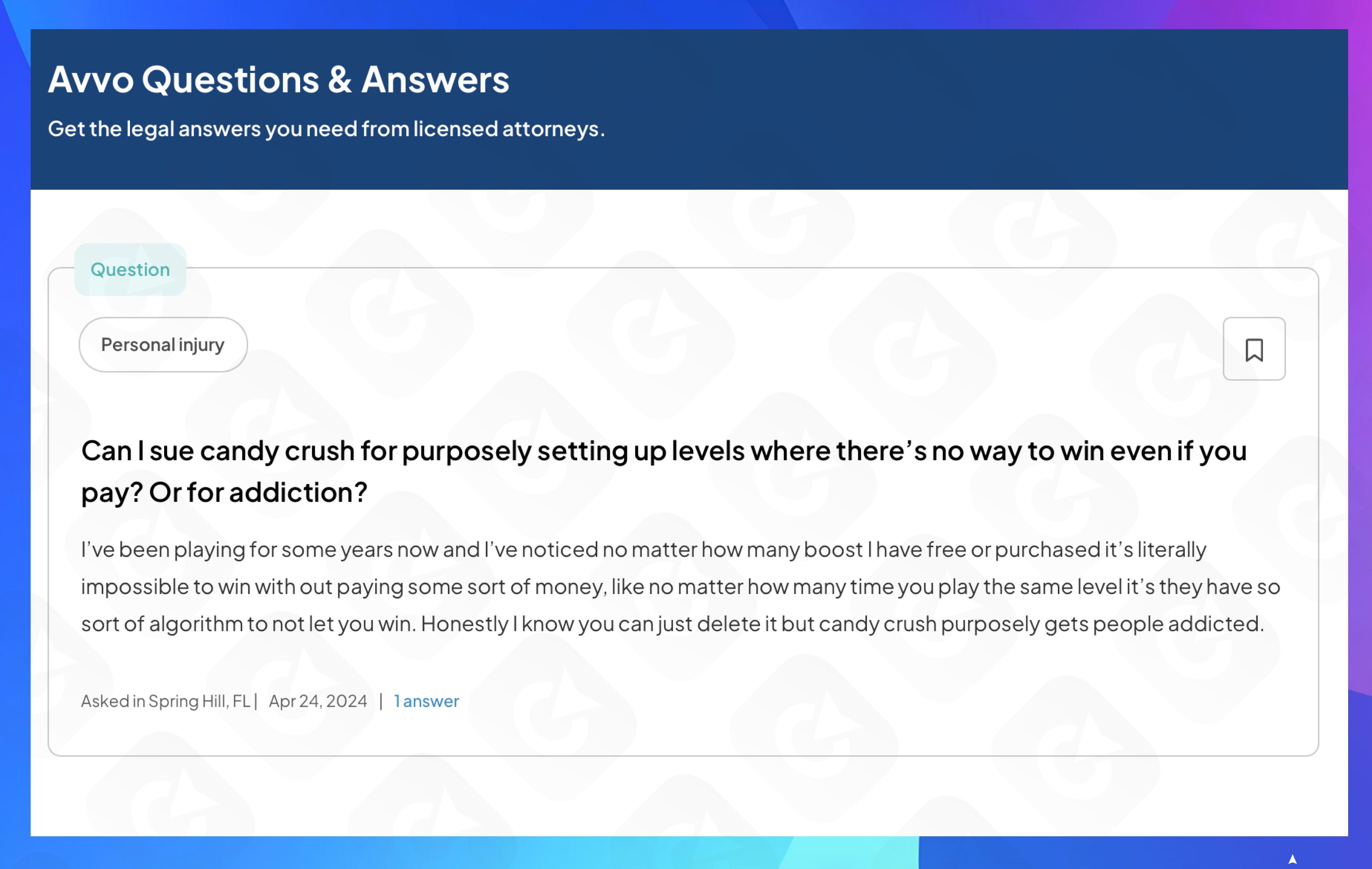
A Q&A section for a personal injury topic on Avvo
Pro tip: be genuine, authentic, and transparent when participating in Q&As. Avoid overly promotional or salesy language and focus on genuinely helping and educating others.
Getting quality links is never easy. However, lawyers have topical expertise that can attract links from high-authority websites if used correctly. This link-building strategy is especially useful for new law firms with limited budgets.
4. Participate in Podcasts
Participating in interviews and podcasts is an emerging link building tactic for lawyers. As a lawyer, you are an expert in a field that most people know next to nothing about, so sharing your expertise is a perfect strategy to stand out from the competition.
According to Backlinko, there are over 464 million podcast listeners worldwide, which is predicted to reach 504.9 million this year. The average listener spends seven hours per week listening to podcasts.
You do not necessarily have to start your podcast, as it can and will take a tremendous amount of effort, but you can participate in other podcasts in your niche. Look for shows that align with your target audience, reach out to hosts, and you'll be able to secure an interview. Provide insightful information, be charismatic, and you'll be golden.

The Lawyer Podcast is one of the top-ranking podcasts in the field
Pro tip: optimize and promote your appearance on the podcast to maximize exposure. Share the podcast episode on your website, blog, and social media channels, include it in your email newsletters, and encourage your network to listen, share, and engage with the podcast.
5. Establish a Social Media Presence
A good and easy law firm link building tactic would be to establish your social media presence. It takes a little bit of time to set up your profiles (we recommend Facebook, Twitter, Instagram, LinkedIn, and YouTube), and you do not necessarily need to be active on all of them.
Having links from social media networks is suitable for your backlink profile diversity, and it's excellent if you want to dedicate effort to improving your presence. Besides, social media platforms are useful for promoting your law firm’s content easily and for free.
Still, don't pressure yourself to be active if that is something you don't find use in.

An example of a good social media presence for a lawyer
Pro tip: Optimize your social media profiles by providing accurate, complete, and consistent information about your law firm, including your logo, website link, contact details, and an engaging bio or description. Customize your profiles with high-quality images and branding elements that reflect your firm's identity and personality.
6. Create Quality Content
A good link building strategy for lawyers is creating quality content. Starting a blog would be an excellent way to go. If your articles are beneficial and insightful, you will acquire backlinks naturally, as other websites would want to share your posts and refer to you as a credible source.
Being a lawyer, you sure have some expertise and knowledge to share — and the more niche-specific, the better. For instance, a personal injury firm might publish accident statistics or step-by-step guides for what to do after an injury — content that’s genuinely useful. If you're a divorce lawyer, you might focus on creating in-depth resources about the divorce process, custody arrangements, or financial considerations. The key is to create content that addresses the specific concerns and questions of your target clients while demonstrating your expertise in that practice area.
We know you might not always have time to write articles, or it can simply not be your thing. One way to go would be to utilize AI, like ChatGPT, to help you with that, but be aware that AI-generated content is easy to detect and might not be the best quality.

Upwork is one of the most popular freelance-based copywriting services
Pro tip: you wouldn't trust your copywriter to be an amazing personal injury lawyer all of a sudden, right? Instead of doing it yourself, outsource it to one of the best copywriting services so that everybody is doing what they're best at, and you can focus on your work.
7. Use Quality Visuals
Another effective link building strategy is creating viral graphics. By using SEO-optimized images on your website, you improve your backlink profile by having others share your pictures and rank higher in Google Image SERPs. If you need to figure out what kind of graphics you can create for law firms, some easy ways to start would be infographics with statistical data, checklists, tables, or even memes.
The research by Persuasion Nation states that memes have around ten times more reach and 60% organic interaction than usual graphics; moreover, businesses creating viral memes are 60% more likely to attract clients. Taking a serious topic in a fun way is a great lawyer link building strategy!
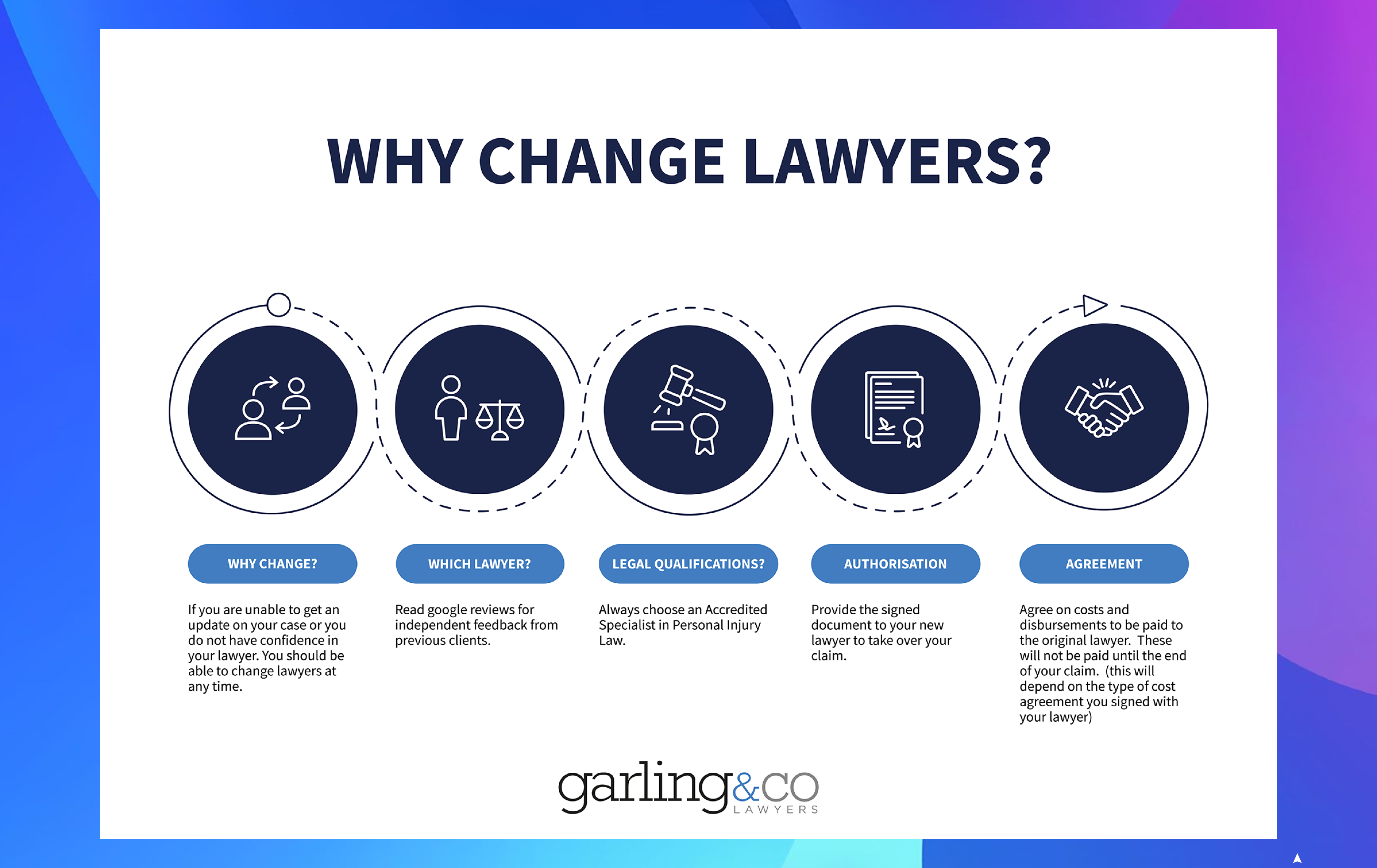
An example of a great law related infographic by Garling & Co
Pro tip: To ensure your images are optimized for search engines, check out our guide on image optimization.
8. Provide Scholarships
Another great link building strategy for lawyers is providing educational scholarships for a mention and a backlink. You may be wondering if investing a significant portion of the budget to acquire one backlink from an academic website is a good idea, and the answer is yes. Not only is the amount and diversity of your backlinks crucial, but it's also beneficial to have your backlinks from different domains, and .gov and .edu domains are among the best ones to have in your portfolio. Search engines consider Edu links credible and valuable, so having such websites refer to you will significantly improve your search engine rankings.

“Scholarships” section of The Dominiguez Firm website
Pro tip: Research and select institutions with a solid online presence, high domain authority, and a significant and engaged audience.
9. Fix Unlinked Mentions & Broken Backlinks
This is one of the easiest yet crucial link building strategies for attorneys. Sometimes, other websites will quote or refer to you but not directly link to your website, such as when publishing an article and adding you as a source. You can ask them to add a link to the mention.
The same goes for broken backlinks: you must routinely check all the broken links and reach out to the website owners to update them. You can check your site for broken links with most of the free SEO tools, like Ahrefs Backlink Checker, Dead Link Checker, and so on.
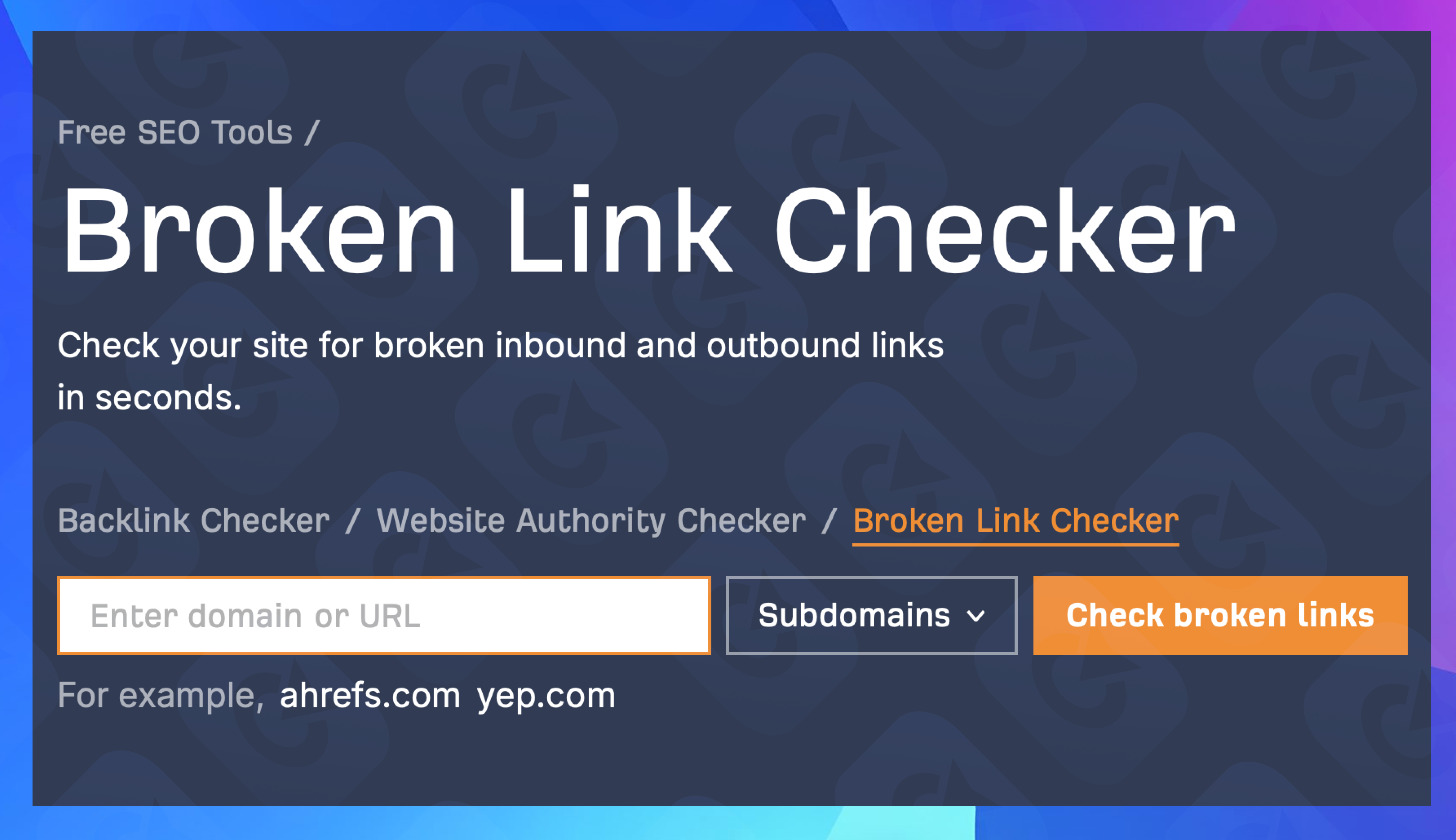
One of the easiest ways to check your website for broken links is to use Ahrefs Free Broken Link Checker
Pro tip: don't worry — you do not have to search for every mention on the web manually! Just set up Google Alerts to receive an email whenever someone mentions your law firm. This way, all you'll have to do is check the mention, and if it doesn't include a link, reach out to the website owners, thank them for the mention, and ask if they could provide you with a backlink.
10. Additional Link Building Tactics For Lawyers
Below is a short table with other easy and proven-to-work methods (including pro tips!) for lawyer link building strategy.
|
Take note-worthy cases |
Another effective link building strategy for lawyers is turning their cases into PR opportunities. For instance, if you're presenting a celebrity or a well-known company, it can be easily turned into a link building opportunity. This is when you might even get featured on global news websites like Forbes. Share your experience with the world! |
Partner with legal influencers to share and promote your notable cases and success stories. |
|
Offer your commentary on notable cases |
As a lawyer, your opinion on other cases is a valuable asset. Utilize it to provide commentary on famous cases to receive more backlinks to the law firm's website! |
Participate in legal forums and communities! One of the good ways to do that is to browse through Reddit's legal subreddits, such as r/askalawyer. |
|
Ask for community mentions |
Utilize your existing clientele! Ask your previous clients, colleagues, or even friends and family for a backlink. Encourage them to share their positive experiences and testimonials about your legal services. These efforts help you earn backlinks by showcasing your expertise on trusted platforms. |
Utilize referral programs for your existing clients to motivate them to share positive experiences. |
|
Duplicate competitor backlinks |
Analyze and research your competitors' backlink profiles to determine what works best in your niche. Review their backlinks and guest posts, and examine the websites that refer to them. Securing the same or similar backlinks is one of the most effective strategies to promote your law firm's website. |
Continuously monitor your competitors' backlink strategies and efforts, and stay updated and informed about changes, trends, and developments in the legal industry. |
|
Write books or reports |
A great way to establish your expertise would be to create and publish books or reports on legal topics and trends. Often, you can find your books or reports being reviewed or referenced by other authors or researchers in the legal field, and typically, the reviews will include backlinks to your website. If not — you can always ask them to! |
Share snippets and engage with your audience to build anticipation and interest and attract more readers and potential backlinks. |
|
Conduct outreach |
Be proactive! Outreach to legal publications or influencers in the legal industry to ask for collaboration. |
Effective outreach emails are personalized, concise, and value-focused. Clearly explain who you are and why you're reaching out, focusing on how your content adds value to their audience. Read our guide on outreach for link building to get more insights! |
| Use HARO (Help a Reporter Out) |
As a legal expert, you possess valuable insights that media outlets need for their stories. HARO connects you directly with journalists seeking authoritative quotes on legal matters, current events, and industry trends. By providing thoughtful commentary on relevant queries, you can earn high-quality backlinks from reputable news sites and publications that quote your expertise. |
Monitor HARO emails daily and respond within hours. Craft comprehensive, quotable responses that demonstrate your legal knowledge. Focus on providing genuine value rather than self-promotion, as this increases your chances of being selected and quoted. |
The Foundation of Legal SEO: Understanding Backlinks
Backlinks are links from third-party websites that lead to your site. They are one of the most powerful ranking signals in Google’s algorithm that directly impact your law firm’s search visibility.
A real question many law firms have is 'How many backlinks does my website need?' This is a complex question with many variables, but the simple answer is that it depends on your competition. If the top-ranking websites for your target keywords have hundreds of referring domains, you'll likely need a similar number to compete. However, quality always trumps quantity — 10 links from authoritative legal websites can be more valuable than 100 links from low-quality sources.
Let’s discover what are good legal backlinks.
What Is a Good Backlink for a Law Firm Website?
A good backlink for a law firm website should meet three important criteria based on which Google evaluates each link:
- High domain authority: links from established, trusted websites like bar associations or legal publications carry more weight than obscure blogs.
- Topical relevance: websites related to legal topics or your specific practice areas provide more valuable signals to Google than unrelated websites.
- Contextual placement: when a link is naturally integrated into the content, it provides greater SEO value.
When searching for backlink opportunities, also keep in mind that quality source is the one that has:
- Strong organic traffic: backlinks from sites that real people actually visit and engage with demonstrate genuine endorsement.
- Clean backlink profile: the linking site should have earned its own authority naturally, without manipulative tactics.
A good backlink generates a good link juice, also known as link equity. That is associated with Google’s first ranking algorithm (PageRank) and refers to how a link can pass authority from one website to another. Whether a backlink passes link juice — and how much — depends on its placement on the referring page, its type (dofollow or nofollow), the authority of the referring domain, whether it's using HTTPS and the number of outgoing links on that page.
To sum up: When evaluating link-building opportunities, always consider the authority and relevance of the linking domain, as well as the organic, non-manipulative context of the link placement. High-quality links come from trustworthy sources and are seamlessly integrated into the content, offering real value to users.
How to Create Your Law Firm's Link Building Strategy?
Now that you know the best link building tactics for lawyers, you might be overwhelmed with all the options and need help figuring out where to start or what to implement.
New law firms can compete with established ones in link building by focusing not on outscaling larger competitors but on using smart, strategic efforts. That means identifying less competitive topics or practice areas, creating genuinely helpful content, and building relationships with local websites or niche directories. It’s also important to optimize the homepage or key practice area pages and build links to them — this can significantly boost visibility.
With consistency and the right focus, new firms can earn high-quality backlinks and improve their visibility without needing the large budgets that established firms often have. For example, attorneys can participate in local legal events, or the firm can sponsor community events to earn media mentions. This helps build both backlinks and brand awareness.
Solo practitioners often have a tougher time with link building because of limited time and budget. Instead of spreading yourself too thin, focus on a specific legal niche and get involved in your local community. Joining local bar associations, volunteering for legal aid, and connecting with nearby professionals can lead to valuable backlinks and referrals. Also, don’t overlook local news sites and community blogs — they’re usually easier to get featured on than big national outlets.
For niche legal practices, the key is to become the go-to resource in your specialty. Publish clear, in-depth guides on complex topics and target industry-specific sites — not just legal ones. For instance, an entertainment lawyer might gain links from media and arts outlets. Niche forums and professional associations are also great places to earn quality backlinks.
Whatever the specialty, law firm websites need backlinks from authoritative, topic-relevant online portals such as reputable legal directories, government or educational websites, and renowned media outlets to strengthen their E-E-A-T (Experience, Expertise, Authoritativeness, and Trustworthiness). Creating content that reflects genuine expertise and trustworthiness on their own blogs is also a key factor.
Moreover, with more users turning to voice search, optimizing pages to answer common legal questions in a natural, conversational tone is increasingly important. These shifts show that the future of link building lies in genuine relevance and authority, not just link volume.
If you develop and implement an effective link building strategy, strong SEO results won’t be far behind.
That said, it’s important to set realistic expectations for when you might see your law firm’s rankings improve.
How many links should you build each month to make it happen? There's no one-size-fits-all answer as it depends on a lot of factors, including the location of your legal services and the size and budget of your law firm. For small to medium law firms, securing 3-5 high-quality relevant links per month is typically a realistic and effective approach. Larger firms with more resources might target over 12 monthly links. Whatever your capacity, consistency is key — it's better to get 3 quality links every month than to build 20 one month and none for the next six.
Link building takes time to deliver noticeable results. As a general rule, you can expect to see initial improvements within 3–6 months, with more substantial gains typically appearing after 6–12 months of consistent effort.
Below, you’ll find an easy-to-follow checklist for creating a lawyer link building strategy.
Step 1. Analyze Your Website
First of all, you have to analyze what's already out there. Find and fix all errors, optimize your web pages, improve existing articles, etc. To fully grasp what you have to do to improve your backlink profile, you have to figure out which pages you want the other websites to refer to — it won't always be your home page. Feel free to use our interactive checklist for SEO to track your progress.
To check your current backlink profile, use SEO tools like Ahrefs, Majestic, etc. — they show who’s linking to your site, which pages they’re linking to, and what anchor text they’re using. Look for low-quality or spammy links that could hurt your rankings and identify high-performing links worth replicating. This audit will help you understand your link landscape and plan your next steps strategically.
Step 2. Identify Your Target Audience
As with any other marketing strategy, you must know your target audience to create an effective lawyer link building strategy. Analyze your existing clientele and create a buyer persona based on that. Analyze your competitors' audience — what do they all have in common? To help you with this process, you can also utilize surveys, your social media insights, and so on.
Step 3. Analyze Your Competitors
Conduct thorough market research to determine which strategies work best in your niche. Find a few top-ranking law firms' websites and try to understand what works best for them. Look for opportunities to implement for your website — maybe you can even reach out to the same websites that provide them with backlinks to have yours listed there as well.
Find your competitors using Ahrefs
- Go to Ahrefs.
- Enter your project URL in Site Explorer.
- In the “Organic competitors” tab, select the traffic platform.
- Go to the “Referring domains” section.
- Export all links to CSV (UTF-8) format.
Get your competitors’ backlinks in just a few clicks
To discover your competitors’ backlink prices and secure them in just a few clicks — without spending hours searching for website owners’ contact details and negotiating link placements — use Collaborator’s “My List” feature. Simply upload a file of your competitors’ backlinks to the platform and instantly see which ones are available for ordering guest posts with a link.
Read our article How to Spy on Your Competitors to Capture Similar Links for a detailed guide on analyzing your competitors’ backlink profiles.
You can also learn more about Collaborator’s “My List” feature in our article Locate Competitors' Backlinks in Collaborator.pro in 2 Minutes.
Step 4. Audit Your Resources
Assess your available resources, including the budget and team members. This way, you'll have a clear understanding of which tasks you can divide within the team and what you will need to outsource. Allocate a specific part of the budget for each task, but don't try to be too specific—a rough estimate will be a good starting point.
Step 5. Create a Plan
Create a detailed link building plan based on your research and available resources. Determine who will be responsible for what, which link building strategies you will use, and the deadlines for completing each part of the plan. A clear and structured plan will ease the process of link building.
Step 6. Prepare All Materials
Gather all materials needed for your plan. This includes materials for new content, existing articles that need to be updated, any ideas that you would like to add, a list of websites to which you will be reaching out, and so on. Getting all your materials ready will streamline the link building process and save you tons of headaches later on.
Step 7. Create & Optimize Content
Using the materials you've prepared, create high-quality content based on your plan. This includes blog posts, videos, webinars, infographics, podcasts, and everything else you want to utilize. Optimize it with relevant keywords, work on internal link building, and move on to the next step.
Step 8. Publish & Outreach
After you've published and polished all content to your website and made sure it's search engine optimized, you’re ready to move on to the final step. Contact websites, engage in social media marketing, participate in community discussions and Q&As, and implement guest posting. A friendly reminder: Collaborator has over 5K law and jurisprudence-related websites on which you can publish articles to ease the law firm link building process.
What to Avoid When Building a Backlink Profile?
Like any other niche, link building for lawyers has its own do's and don'ts. Now that you know the basics, it's time to explore the pitfalls. While having many backlinks might seem like a good idea, it's better to stick to Google's Guidelines. Going against them can result in penalties, lowering your website's rankings and traffic. Below is the do-not list of the things you must avoid while building a law firm backlink profile.
1. Low-quality Backlinks
As previously mentioned, quantity does not equal quality. A bad backlink is one that is missing, broken, or located on a website unrelated to your niche or on a spammy website.
It’s a good practice to continuously monitor your backlink profile using SEO tools like Ahrefs to identify suspicious or harmful links and disavow them with Google’s tool. This helps prevent potential penalties from Google and improves your website’s overall link profile.
If your law firm’s website got hit with a penalty because of bad backlinks, the first thing to do is review all incoming links using tools like Ahrefs or Google Search Console. Find the harmful or spammy ones and either get them removed or disavow them. If Google applied a manual penalty, you need to request a review after cleaning things up — and from there, focus only on earning links naturally through solid content and outreach.
2. Link exchange
Google considers link exchange a bad practice as it is inorganic. It may even penalize the websites that exchange backlinks in bulk. It's also easier to stumble onto a spammy website if you participate in link exchange — assuming they are not niche-related, you cannot guarantee what other websites are exchanging their links with them.
3. Link Farms
Obtaining backlinks in bulk from so-called link farms is what Google calls a "link scheme." Search engine crawlers are good at determining link-buying patterns, so even if you try to do it carefully, the odds are you'll still be caught red-handed.
4. Off-topic Link Placements
While guest posting is a great SEO practice for lawyer link building, it can have its cons. You must be careful when choosing a link donor for your guest posts. Otherwise, Google could consider it unnatural, which would result in penalties. Check out our catalog to find trusted websites and filter them by topic — this way, you will ensure your content is suitable for the website.
5. Backlink Just for the Sake of Backlink
This rule is simple yet important: do not comment, post, or publish an article just to get a backlink. Focus on quality and user experience — this way; you will be much more likely to receive more organic traffic and rank higher in SERPs.
The key is to ensure that your guest post, comment, or social media post provides real value to users. Additionally, the anchor text — the clickable text that takes users to another page or website — should be meaningful and clearly indicate the content of the page it links to. It’s important because:
- It provides search engines context about the linked page’s content. As an example, a brand anchor, “Baker McKenzie LLP,” signals to search engines that the linked page is about the company.
- It improves user experience by letting users know what content they can find on the linked page. As an example, a descriptive anchor text, “divorce laws in the United States,” that users find exactly what they expect when they click — information specifically about U.S. divorce regulations — which improves user experience and boosts SEO relevance.
To sum up: a good anchor text builds trust with users and search engines.
Anchor text optimization is not only about making it describe the page you're linking to but also using natural, relevant keywords instead of generic phrases like “click here.”
You can use ChatGPT to optimize your anchor text or at least get an idea of how to do it.
6. Over-Optimization & Black-Hat SEO
Over-optimizing your articles and anchor texts to the point where they only consist of keywords will result in being penalized by Google. This practice, known as keyword stuffing, is considered a black-hat SEO, and you should avoid it when link building for law firm websites.

Some other black-hat SEO techniques to avoid are:
|
cloaking |
the practice of showing different content to search engines and users |
|
duplicate content |
publishing duplicate content on multiple web pages or domains |
|
hidden text |
placing keyword-rich text on the webpage and hiding it from users by making the text transparent |
7. Non-original Content
As mentioned before, posting non-original content is a black-hat SEO practice and can, therefore, be penalized by Google. Moreover, it will simply make your website look like all the others—having unique, high-quality content will make it work.
8. Incorrect Geolocation
This is mostly for local businesses: make sure you're doing your outreach or guest posting to websites that are local to you. Of course, getting traffic from other countries will help you boost your rankings, but since the main end goal is to generate more leads and receive new clients, you should focus on receiving your local traffic.
A proven way for local law firms to earn valuable backlinks is through sponsorships and partnerships. In many cases, local media outlets cover these events and publish news about them. This not only helps you gain local backlinks but also boosts brand awareness and recognition. As an added bonus, it can open the door to more collaboration opportunities with other local businesses.
If your law firm has multiple locations, it’s important to create a tailored link-building strategy for each one that accounts for language differences, local search engines, and regional preferences. That means:
- Building out individual location pages with unique content.
- Targeting local directories.
- Getting featured in publications specific to each area.
- Building relationships with legal directories, publications, and industry associations in each country.
- Creating a Google Business Profile for each office.
Taking this approach gives your firm a better chance to rank and compete in multiple geographic markets at once.
How to Measure the Success of a Law Firm's Link Building Campaign
If you're investing time and effort into link building, it's important to understand how it's helping your law firm grow. To do that, you’ll need to track the right key performance indicators (KPIs) — the metrics that show whether your strategy is actually working.
Here are a few KPIs to keep an eye on:
- New backlinks and their quality. It’s not just about the number — getting links from trusted, high-authority sites is what really matters.
- Referral and organic traffic. More visitors coming from links on other sites means you’re reaching the right audience. And if your organic traffic is going up, it’s a good sign that search engines see your site as more credible.
- Search rankings. Use tools like SE Ranking, Ahrefs, or Google Search Console to check if your pages are climbing in the search results for targeted keywords.
- Conversions from referral traffic. At the end of the day, the goal is more clients. Track how many leads or inquiries are coming from the backlinks you've built.
When elevating your link building success, you should also consider the ROI of your link-building campaign. To figure it out, start by adding up what you’ve spent — things like tools, content creation, and outreach. Then, look at how much revenue those efforts brought in by tracking leads or clients that came from referral traffic.
You can use tools like Google Analytics and UTM tags to see which links actually drove conversions. Finally, subtract your total costs from the revenue, divide that number by your costs, and you’ll get your ROI — a clear measure of how effective your strategy really is.
Consider Collaborator.pro Your Trusted Partner
This is a friendly reminder that if you're unsure where to start, Collaborator has your back. Of course, you can always outsource your link building to SEO agencies, but you can also quickly do it yourself. With Collaborator, you're able to choose from 37K trusted websites and check their traffic data.
Collaborator has over 5,000 law & jurisprudence websites in its catalog
Filter the catalog by topic, location, and other settings, and pick the needed filters. Guest posting and link building for law firms has never been more accessible!
Conclusion
In conclusion, navigating the complex landscape of law firm marketing requires a strategic approach, especially in the era of rapid digital evolution. Building a strong backlink profile remains a key element for organic growth and improved search engine rankings. From legal directories to guest posting and engaging in podcasts, the strategies we've covered will let you elevate your online presence and connect with potential clients.
Remember, the key is not just to accumulate backlinks but to cultivate quality connections that reflect your firm's credibility and expertise. A good backlink for a law firm website comes from a topically relevant site with high domain authority, consistent organic traffic, and a clean and natural backlink profile.
While it may seem daunting, with the right tools, like Collaborator, and a clear understanding of your target audience, you can effectively harness the power of link building to set your law firm apart.
We hope this guide has provided you with valuable insights and actionable strategies to kickstart your law firm's link building process. We wish you the best of luck in securing high-quality backlinks and driving organic traffic to your website. Happy link building!








